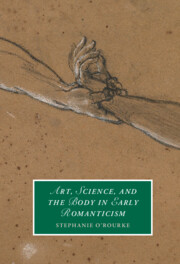Book contents
- Art, Science, and the Body in Early Romanticism
- Cambridge Studies in Romanticism
- Art, Science, and the Body in Early Romanticism
- Copyright page
- Contents
- Figures
- Acknowledgments
- Introduction
- Chapter 1 De Loutherbourg’s Mesmeric Effects
- Chapter 2 Fuseli’s Physiognomic Impressions
- Chapter 3 Girodet’s Electric Shocks
- Chapter 4 Self-Evidence on the Scaffold
- Notes
- Bibliography
- Index
- Cambridge Studies In Romanticism
Chapter 4 - Self-Evidence on the Scaffold
Published online by Cambridge University Press: 28 October 2021
- Art, Science, and the Body in Early Romanticism
- Cambridge Studies in Romanticism
- Art, Science, and the Body in Early Romanticism
- Copyright page
- Contents
- Figures
- Acknowledgments
- Introduction
- Chapter 1 De Loutherbourg’s Mesmeric Effects
- Chapter 2 Fuseli’s Physiognomic Impressions
- Chapter 3 Girodet’s Electric Shocks
- Chapter 4 Self-Evidence on the Scaffold
- Notes
- Bibliography
- Index
- Cambridge Studies In Romanticism
Summary
The fourth chapter offers an extended conclusion that examines an international controversy ignited by the guillotine that revolved around the relationship between cognition and sensation, the evidentiary authority of bodily experience, and the limitations of human perception. It argues that the works of Fuseli, Girodet, and de Loutherbourg point to the radical remapping of an Enlightenment empirical framework that used the human body as a privileged source of knowledge. The controversies that circulated around the guillotine heralded, instead, a world in which “appearance” and “truth,” “seeing” and “knowing,” were radically decoupled – a world where scientists began removing direct sensory observation from their experimental procedures and where the idealized nude body no longer stabilized pictorial meaning. It proposes that this shift had significant implications for the epistemological status of experience for Romanticism, more broadly.
Keywords
Information
- Type
- Chapter
- Information
- Art, Science, and the Body in Early Romanticism , pp. 151 - 181Publisher: Cambridge University PressPrint publication year: 2021
